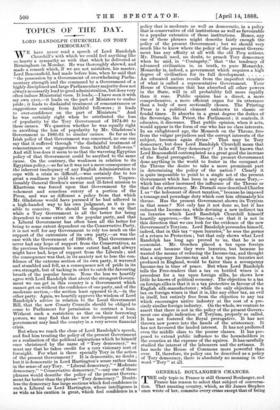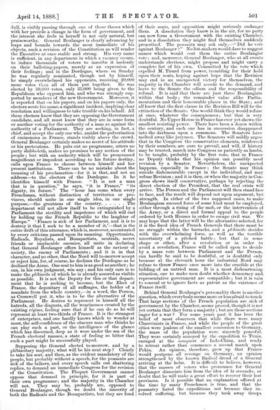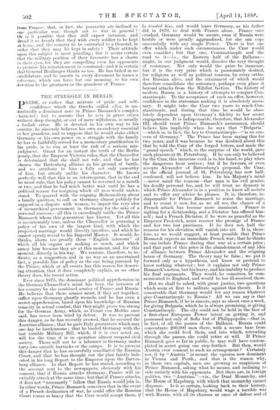GENERAL BOULANGER'S CHANCES.
only topic in France is still General Boulanger, and France has reason to select that subject of conversa- tion. That amazing country, which, as Sir James Stephen once wrote of her, commits every crime except that of being dull, is visibly passing through one of those throes which with her precede a change in the form of government, and the interest she feels in herself is not only natural, but praiseworthy. General Boulanger is clearly advancing by leaps and bounds towards the most immediate of his objects, such a revision of the Constitution as will render the rxecutive at once stable and strong. His very name is sufficient, in any department in which a vacancy occurs, to induce thousands of voters to inscribe it uselessly on their balloting-papers, merely as an expression of their feelings ; and in the Dordogne, where on Sunday he was regularly nominated, though not by himself, he simply overwhelmed his opponents, receiving 20,000 more votes than all of them put together. He was elected by 59,000 votes, only 35,000 being given to the Republican who opposed him, and who was strongly sup- ported by members of the new Government. Moreover, it is reported that on his papers, and on his papers only, the electors wrote his name, a significant incident, implying clear resolution and willingness to take trouble on his behalf. All these electors know that they are opposing the Government candidate, and all must know that they are in some form or another voting for the authority of a man as against the authority of a Parliament. They are seeking, in fact, a chief, and accept the only one who, amidst the pulverisation of eminencies in France, stands visibly above the crowd. General Boulanger certainly makes no secret of his attitude or his pretensions. He puts out no programme, utters no party shibboleth, makes no promises to any section of the people ; but with an audacity which will be pronounced magnificent or impudent according to his future destiny, calls upon France to choose between himself and her present institutions. There can be no mistake about the meaning of his proclamation—for it is that, and not an address—to the electors of the Dordogne. In it he identifies himself with France. " It is not a man that is in question," he says, " it is France," " its dignity, its future." The " hour has come when every Frenchman, without distinction of territories or pro- vinces, should unite in one single idea, in one single purpose,—the greatness of the country The department will not allow itself to be extinguished by a Parliament the sterility and impotence of which will end by holding up the French Republic to the laughter of Europe." France is sick of her Parliament, and it is to destroy it that I seek to be a member of it,'—that is the entire drift of this utterance, which is, moreover, accentuated by every criticism passed upon its meaning. Opportunists, Radicals, Royalists, and Bonapartists, neutrals, secret friends or implacable enemies, all unite in declaring that General Boulanger offers himself as the saviour of society, the enemy of Parliaments ; and it is in that character, and no other, that the Nord will to-morrow accept or reject him, for, of course, he declines the Dordogne as he declined the Aisne. One seat to him is as good as another ; he can, in his own judgment, win any ; and his only care is to make the plebiscite of which he is already assured as visible as possible. It is not the Deputy for this or that depart- ment that he is seeking to become, but the Elect of France, the depositary of all suffrages, the holder of a mandate from the whole country,—in a word, the Person, as Cromwell put it, who is to be the alternative of the Parliament. He desires to represent in himself all the hatreds, all the disgusts, all the wearinesses created by the existing regime, feeling sure that if he can do so he will represent at least two-thirds of France. It is the strangest of enterprises, and one hardly knows which to wonder at most, the self-confidence of the obscure man who thinks he can play such a part, or the intelligence of the glance which has discerned, deep as it were under the sea of the French electoral masses, a state of feeling so bitter that such a part might be successfully played. Supposing the General elected. to-morrow, and by a ple'biscitary majority, what will be his next step ? Clearly to take his seat, and then, as the evident mandatory of the people, but probably without a speech, for the peasants are sick of the talkers, and every speech calls out shattering replies, to demand an immediate Congress for the revision of the Constitution. The Floquet Government cannot oppose that demand in principle, for it is part of their own programme; and the majority in the Chamber will not. They may be, probably are, opposed to General Boulanger, though we doubt the sincerity of both the Radicals and the Bonapartists, but they are fond of their seats, and opposition might seriously endanger them. A dissolution they Imow is in the air, for no party can now form a Government with the existing Chamber, and in a dissolution they might find themselves suddenly proscribed. The peasants may ask only,—" Did he vote against Boulanger P' No list-makers would dare to suggest names which would cost them the entire Boulangist vote ; and, moreover, General Boulanger, who at all events understands elections, might propose and might carry a complete list of his own. Committed by the vote which expelled M. Tirard from power, trembling for their hold upon their seats, hoping against hope that the Revision may end in an unexpected victory for themselves, the majority in the Chamber will accede to the demand, and leave to the Senate the odium and the responsibility of refusal. It is said that there are just three Boulangists within that body ; the remainder value alike Parlia- mentarism and their honourable places in the State ; and all know that the first clause in the Revision Bill will be the extinction of the Senate. One would think they would refuse at once, whatever the consequences ; but that is very doubtful. No Upper House in France has ever yet shown the smallest resisting power. There have been a dozen within the century, and each one has in succession disappeared into the darkness upon a summons. The Senators have melted away like jurymen. The Senators will mildly argue that in the Congress the conservative elements, reinforced by their numbers, are sure to prevail, and will, if history may be trusted, march into Congress as patiently as lambs, to be taught, probably by the first vote, that in France no Deputy thinks that his opinion can possibly need revision by a Senator. Nevertheless, the unexpected happens, especially in France ; the Senate may think suicide dishonourable except in the individual, and may refuse Revision ; and it is then, or when the majority in Con- gress shows itself conservative, perhaps by rejecting the direct election of the President, that the real crisis will arrive. The Person and the Parliament will then stand face to face, and the result will depend not upon argument, but strength. In either of the two supposed cases, to make Boulangism succeed force of some kind must be employed, either through a rising of the mob, or the intervention of the Army, or a direct and formal appeal to the people ordered by both Houses in order to escape civil war. We may hope that the latter will be the alternative selected, for it is the fixed idea of French Generals that there must be no struggle within the barracks, and a plebiscite decides with the overwhelming force, as well as the terrible uncertainty of a pitched battle ; but that in some shape or other, after a revolution or in order to avoid a revolution, France will be called upon to decide by a mass vote between Parliament and the Person, can hardly be said to be doubtful, or is doubtful only because at the eleventh hour the industrial Nord may . refuse to throw France once more into the crucible at the- bidding of an untried man. It is a most disheartening situation, one to make men doubt whether democracy and„ representative government are compatible ; but it is vain to conceal or to ignore facts as patent as the existence of France itself.
Behind General Boulanger's personality there is another question, which everybody seems more or less afraid to touch That large sections of the French population are sick of government by the Chamber, seems proved, though it is not yet certain that they form a majority ; but are those sections eager for a war ? For some years past it has been the belief of most observers that while there were many Chauvinists in France, and while the people of the great cities were jealous of the smallest concession to Germany, the mass of the population were sincerely peaceful. They were certainly annoyed by the expedition to Tunis, enraged at the conquest of Indo-China, and ready to retreat rather than commence a second march upon Pekin. An opinion, therefore, grew ,up that France. would postpone all revenge on Germany, an opinion strengthened by the known Radical dread of a General arriving at the helm. It is difficult to believe, however, that the masses of voters who pronounce for General Boulanger dissociate him from the idea of la revanche, or doubt that he will make a great effort to recover their lost provinces. Is it possible that an explanation offered at the time by many Frenchmen is true, and that the peasantry hated the expeditions not because they in- volved suffering, but because they took away troops from France ; that, in fact, the peasantry are inclined to one particular war, though not to war in general ? Or is it possible that they still expect invasion, and dread it so keenly that they wish every soldier to be kept at home, and the country to be entrusted to a General, in order that they may be kept in safety ? Their attitude upon this subject is most puzzling ; but it seems certain that the military position of their favourite has a charm in their eyes, for they are compelling even his opponents to promise his reinstatement in command ; and it is certain that General Boulanger thinks so too. He has failed in no candidature, and he inserts in every document he issues a reference, which can have but one meaning, to his own devotion to the greatness or the grandeur of France.




































 Previous page
Previous page